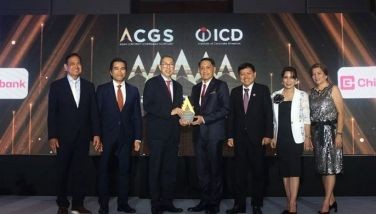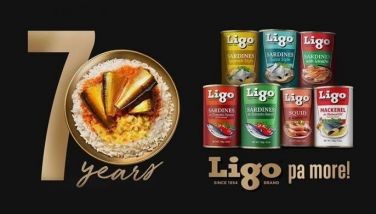The tricky business of succession
February 14, 2005 | 12:00am
Whether in politics, business or even a religious institution like the Catholic Church with the frail Pope John Paul II, the question of who will be the next leader is of paramount concern to all. Perhaps more difficult than establishing a business or organization from scratch is the arduous challenge of preparing for one’s own exit. How do leaders objectively, humbly and smoothly prepare succession? When shall we realize that nobody is indispensable, that a test of leadership is whether the institution can still flourish and continuously renew itself when we are already long gone or kicked upstairs?
In the topsy-turvy world of Philippine business, the merry-go-round of ascendant fortunes and reversal of fortunes is almost breathtaking in their fascinating twists and turns. For instance, the changing ownership of Tanduay Distillery reflects the dynamic flux of fading old-rich money versus the vigorous energy and ambitions of brash, self-made fortune. Established in 1854, Tanduay Distillery was once under the control of the once pre-eminent Elizalde family whose partners were fellow Basques, the Ynchaustis.
Two years after the Edsa I uprising and with a new government considered politically antagonistic to him, immigrant "rags-to-riches" billionaire Lucio Tan still in 1988 bought Tanduay and infused investments to expand it 50 times bigger. It now has distilleries in Manila, Laguna and Bacolod, with a major new facility scheduled for operations next year in Cagayan de Oro City, Mindanao. It is ironic that although Lucio Tan does not drink liquor, his Tanduay brand reputedly controls 98 percent of the domestic rhum market and is even exported.
The saga of another top liquor brand again illustrates the ups and downs of business families, whose heirs had either lost interest in business, had become too comfortable and laid-back, or had simply wanted to cash in on their forebears’ legacy. Penniless Chinese immigrant Carlos Palanca Tan Guin Lay founded a small distillery in Tondo, Manila called "La Tondeña Incorporada" and building it up as No. 1 in the Philippines. By 1924, the Chinese Chamber of Commerce President Carlos Palanca purchased the landed Hispanic Roxas-Ayala-Zobel’s main distillery business lock, stock and barrel – including their headquarters in Calle Echague (now Palanca Street), Quiapo, Manila and the prized Ginebra San Miguel brand.
Six decades later in 1987, Palanca’s mestizo heirs ceded control of their family jewel to San Miguel Corporation (SMC) in a "joint venture". A few years ago, Eduardo "Danding" Cojuangco Jr. formalized the demise of this Palanca firm and buried it by renaming this La Tondeña subsidiary as Ginebra San Miguel. Today, Ginebra San Miguel is the country’s No. 1 gin and the world’s third biggest distilled spirit. The only consolation to this business tragedy was that the Palanca heirs had used some of their inheritance to honor the memory of their immigrant founder with the country’s most prestigious annual Don Carlos Palanca Memorial Awards for Literature.
Unknown to most people, the Hispanic Roxas/Ayala/Zobel clan had weathered the vicissitudes of dynastic decline with the providential help of capable sons-in-law such as the first Antonio de Ayala, then the Zobels and then the 20th century developer of Makati, Joseph McMicking Jr. The Ayala conglomerate was originally Casa Roxas, then when the son-in-law took over, the firm was renamed Ayala y Compania. The late historian Carlos Quirino told this writer that the first Ayala was a Basque, a nephew of the then powerful Archbishop of Manila and his tomb is now inside the San Agustin Church in Intramuros. Quirino added that Zobel was a German Jew.
Like the Ayala experience, the Harvard-educated industrialist Salvador Araneta relied on his son-in-law to perpetuate his business success. He founded Asia’s pioneering flour mill as the core of the modern-day RFM Group of Companies. He appointed his son-in-law Jose Concepcion Jr. as his successor. Today, carrying on the vision of the late founder is his entrepreneurial and aggressive La Salle-schooled grandson Jose "Joey" Araneta Concepcion III. The Araneta/Concepcion family had not stumbled into traumatic reversal of fortunes like that of other famous old business clans.
Although still wealthy, the third-generation Lopezes of ABS-CBN 2 led by Harvard-educated Eugenio "Gabby" Lopez III has already lost TV/radio industry leadership to upstart rival GMA 7 led by Yale-educated Atty. Felipe "Henry" Gozon. Despite their impeccable political connections, the Lopez family’s water utility business, the Rockwell mall/realty development and the Bayantel telecom firms have not performed well compared to the Zobel-Ayala family’s profitable water utility operations, Greenbelt/Glorietta mall and realty projects, and Globe Telecom. Even with their ABS-CBN TV/radio clout, the magazine business of the Lopez family has lagged behind the aggressive Summit Media led by Lisa Gokongwei-Cheng.
Atty. Felipe Gozon explained that one of the motivations why his family, the Jimenezes and the Duavits, have decided to publicly list GMA Network Inc. this year is their hope of ensuring that the success of the business can continue beyond even the three ruling families’ direct management. By taking a closely-held private corporation public, one can improve professionalization of the management, improving transparency and corporate governance as checks on possible future abuse of power or fatal mistakes.
Like the secretive and inscrutable Chinese emperors whom he idolizes, Lucio Tan has kept his future succession plans a mystery. Was he following a scenario already played out in ancient history, with his various potential successors parceling out the empire into separate independent fiefdoms, or will he just allow a free-for-all contention to determine the eventual future emperor, or maybe he already has a plan but has opted to keep it a secret?
I once asked Tan pointblank why he has not yet revealed his anointed successor or successors, reminding him that the stability of his vast enterprises is crucial to the economic well-being of Philippine society. The country’s wealthiest taipan tapped my shoulder and half-jokingly said: "I plan to sell everything, so I can live a few more years longer." When I commended his fellow rags-to-riches billionaire John Gokongwei Jr. for orchestrating his formal retirement in favor of brother James Go and son Lance Yu Gokongwei, Lucio Tan laughed: "Don’t believe that baloney from Gokongwei. That guy will continue to work very hard everyday until the day he goes to heaven!"
A seemingly murky picture is the succession scenario of RCBC/Malayan Insurance CEO Alfonso Yuchengco. He is a rich third-generation scion who has only some Asian values and whose heirs are considered more westernized in values. One of his sons had publicly resigned from a top post in RCBC. It is said that his daughters might eventually be his successors.
In contrast to the Yuchengco case, the country’s second wealthiest billionaire Henry Sy of SM Group is highly regarded for the traditional Confucian values, work ethic, drive and filial obedience of his children led by eldest child Tessie. Metrobank/Toyota taipan George S.K. Ty also strictly raised his kids in traditional Confucian values and discipline, perhaps because he had seen how his late rich dad Norberto Ty’s favorite son and his half-brother didn’t turn out to be as driven as himself?
The complex issues of succession and long-term viability of an enterprise or organization came to mind, after I received an e-mail from the Ateneo de Manila University’s Filipino-Chinese students organization called Celadon. On February 2, the Ateneo’s Council of Organizations awarded Celadon as the Most Outstanding Student Organization and its president Jules Siegfrid Ang as the Most Outstanding Student Leader. I was very excited, because I was the founder and first president of the Celadon. Today, it has 800 members, plus many awards in past years for many positive projects and for exemplary service to the Ateneo. Previous presidents like Jan Clarence Lim and Christine Ong were also awarded Most Outstanding Leader.
When I conceptualized Celadon, the future was always uppermost in my mind. I took the name from ancient porcelain plates displayed in the Rizal Library, invited the wise late Ateneo president Fr. Jose Cruz S.J. as our first adviser, clearly set down our cultural, civic and other goals. We were driven by our idealism and sense of purpose. I invited Mike Chua, Cathy Sue Villanueva, Johnson Uy and Chris Chua from different high schools to be officers. We prepared two talented leaders to win the two successive elections as second and third presidents of Celadon. For the organizational set-up, I used corporate-sounding posts like vice president for operations, VP-finance, VP-human resource, including assistant vice presidents (for training future leaders). Everything we did, we had intended them to help the future viability of the institution beyond us. Today, as president of the Anvil Business Club, I am seeking the help of our 16 talented officers to revitalize this group with exciting projects of enduring relevance. One of our projects is a talent search to invite members who can be strong future leaders.
Why is it that many revolutionary movements in history continued to burn with fervor despite the arrests and executions of their charismatic leaders? Why is it that an unschooled and poor carpenter’s son from Nazareth was publicly humiliated and executed on a bloody cross, his followers for years persecuted and even fed to the lions, but Christianity endured with passionate leaders and is today the world’s biggest faith?
Why is it many big or small companies don’t survive beyond the third-generation heirs of the founders, but a few select enterprises continue to thrive? How come most of us tinker with gadgets like Palms or use leather-bound diaries to plan everything from summer vacations, to budgets, to weekend activities or how we shall spend Valentine’s Day, but most of us dread, ignore or refuse to plan that ultimate question of our own inevitable exit from this life? Whether as leaders or members of families and organizations, we should plan for a future when we are no longer here. How could we – whether entrepreneurs, professionals, students or housewives – ensure that our personal legacy will endure and be of lasting positive value to others?
Thanks for all your messages. Comments are welcome at wilsonleeflores777@gmail.com, wilson_lee_flores@yahoo.com, wilson_lee_flores@hotmail.com or P.O. Box 14277, Ortigas Center, Pasig City.
Two years after the Edsa I uprising and with a new government considered politically antagonistic to him, immigrant "rags-to-riches" billionaire Lucio Tan still in 1988 bought Tanduay and infused investments to expand it 50 times bigger. It now has distilleries in Manila, Laguna and Bacolod, with a major new facility scheduled for operations next year in Cagayan de Oro City, Mindanao. It is ironic that although Lucio Tan does not drink liquor, his Tanduay brand reputedly controls 98 percent of the domestic rhum market and is even exported.
The saga of another top liquor brand again illustrates the ups and downs of business families, whose heirs had either lost interest in business, had become too comfortable and laid-back, or had simply wanted to cash in on their forebears’ legacy. Penniless Chinese immigrant Carlos Palanca Tan Guin Lay founded a small distillery in Tondo, Manila called "La Tondeña Incorporada" and building it up as No. 1 in the Philippines. By 1924, the Chinese Chamber of Commerce President Carlos Palanca purchased the landed Hispanic Roxas-Ayala-Zobel’s main distillery business lock, stock and barrel – including their headquarters in Calle Echague (now Palanca Street), Quiapo, Manila and the prized Ginebra San Miguel brand.
Six decades later in 1987, Palanca’s mestizo heirs ceded control of their family jewel to San Miguel Corporation (SMC) in a "joint venture". A few years ago, Eduardo "Danding" Cojuangco Jr. formalized the demise of this Palanca firm and buried it by renaming this La Tondeña subsidiary as Ginebra San Miguel. Today, Ginebra San Miguel is the country’s No. 1 gin and the world’s third biggest distilled spirit. The only consolation to this business tragedy was that the Palanca heirs had used some of their inheritance to honor the memory of their immigrant founder with the country’s most prestigious annual Don Carlos Palanca Memorial Awards for Literature.
Like the Ayala experience, the Harvard-educated industrialist Salvador Araneta relied on his son-in-law to perpetuate his business success. He founded Asia’s pioneering flour mill as the core of the modern-day RFM Group of Companies. He appointed his son-in-law Jose Concepcion Jr. as his successor. Today, carrying on the vision of the late founder is his entrepreneurial and aggressive La Salle-schooled grandson Jose "Joey" Araneta Concepcion III. The Araneta/Concepcion family had not stumbled into traumatic reversal of fortunes like that of other famous old business clans.
Although still wealthy, the third-generation Lopezes of ABS-CBN 2 led by Harvard-educated Eugenio "Gabby" Lopez III has already lost TV/radio industry leadership to upstart rival GMA 7 led by Yale-educated Atty. Felipe "Henry" Gozon. Despite their impeccable political connections, the Lopez family’s water utility business, the Rockwell mall/realty development and the Bayantel telecom firms have not performed well compared to the Zobel-Ayala family’s profitable water utility operations, Greenbelt/Glorietta mall and realty projects, and Globe Telecom. Even with their ABS-CBN TV/radio clout, the magazine business of the Lopez family has lagged behind the aggressive Summit Media led by Lisa Gokongwei-Cheng.
Atty. Felipe Gozon explained that one of the motivations why his family, the Jimenezes and the Duavits, have decided to publicly list GMA Network Inc. this year is their hope of ensuring that the success of the business can continue beyond even the three ruling families’ direct management. By taking a closely-held private corporation public, one can improve professionalization of the management, improving transparency and corporate governance as checks on possible future abuse of power or fatal mistakes.
I once asked Tan pointblank why he has not yet revealed his anointed successor or successors, reminding him that the stability of his vast enterprises is crucial to the economic well-being of Philippine society. The country’s wealthiest taipan tapped my shoulder and half-jokingly said: "I plan to sell everything, so I can live a few more years longer." When I commended his fellow rags-to-riches billionaire John Gokongwei Jr. for orchestrating his formal retirement in favor of brother James Go and son Lance Yu Gokongwei, Lucio Tan laughed: "Don’t believe that baloney from Gokongwei. That guy will continue to work very hard everyday until the day he goes to heaven!"
A seemingly murky picture is the succession scenario of RCBC/Malayan Insurance CEO Alfonso Yuchengco. He is a rich third-generation scion who has only some Asian values and whose heirs are considered more westernized in values. One of his sons had publicly resigned from a top post in RCBC. It is said that his daughters might eventually be his successors.
In contrast to the Yuchengco case, the country’s second wealthiest billionaire Henry Sy of SM Group is highly regarded for the traditional Confucian values, work ethic, drive and filial obedience of his children led by eldest child Tessie. Metrobank/Toyota taipan George S.K. Ty also strictly raised his kids in traditional Confucian values and discipline, perhaps because he had seen how his late rich dad Norberto Ty’s favorite son and his half-brother didn’t turn out to be as driven as himself?
When I conceptualized Celadon, the future was always uppermost in my mind. I took the name from ancient porcelain plates displayed in the Rizal Library, invited the wise late Ateneo president Fr. Jose Cruz S.J. as our first adviser, clearly set down our cultural, civic and other goals. We were driven by our idealism and sense of purpose. I invited Mike Chua, Cathy Sue Villanueva, Johnson Uy and Chris Chua from different high schools to be officers. We prepared two talented leaders to win the two successive elections as second and third presidents of Celadon. For the organizational set-up, I used corporate-sounding posts like vice president for operations, VP-finance, VP-human resource, including assistant vice presidents (for training future leaders). Everything we did, we had intended them to help the future viability of the institution beyond us. Today, as president of the Anvil Business Club, I am seeking the help of our 16 talented officers to revitalize this group with exciting projects of enduring relevance. One of our projects is a talent search to invite members who can be strong future leaders.
Why is it that many revolutionary movements in history continued to burn with fervor despite the arrests and executions of their charismatic leaders? Why is it that an unschooled and poor carpenter’s son from Nazareth was publicly humiliated and executed on a bloody cross, his followers for years persecuted and even fed to the lions, but Christianity endured with passionate leaders and is today the world’s biggest faith?
Why is it many big or small companies don’t survive beyond the third-generation heirs of the founders, but a few select enterprises continue to thrive? How come most of us tinker with gadgets like Palms or use leather-bound diaries to plan everything from summer vacations, to budgets, to weekend activities or how we shall spend Valentine’s Day, but most of us dread, ignore or refuse to plan that ultimate question of our own inevitable exit from this life? Whether as leaders or members of families and organizations, we should plan for a future when we are no longer here. How could we – whether entrepreneurs, professionals, students or housewives – ensure that our personal legacy will endure and be of lasting positive value to others?
BrandSpace Articles
<
>



















